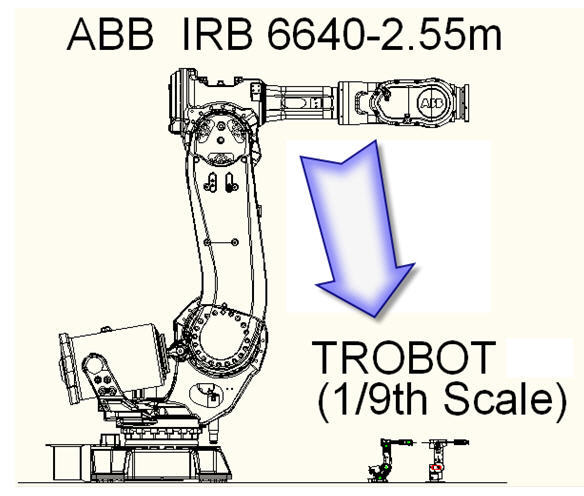We've all probably seen at least a video of an industrial robot. They are gigantic, one-arm looking things that help put together cars. They are pretty cool and have definitely revolutionized the industrial world. In today's post, we are going to look at the TROBOT 4.0 - a miniaturized articulated robot.
This robot was created by Toby Baumgartner and is designed to work alongside humans "relatively safely." Toby says relatively because while the TROBOT could potentially hurt you a little bit, the real industrial robots could crush you like a worm. Yikes.

As you'd expect, the TROBOT is customizable for a number of applications. Versions 2 and 3 used smaller servo motors, while version 4 will be bigger, stronger, and faster. This is the first (or at least one of the first) attempts at a miniaturized industrial robot that we've seen. Good work, Toby!







I know it's easier but you shouldn't use servo's for that :).
ABBs and Fanucs both use servos for their robots. They are highly repeatable and have much smoother operation on that scale. I work at a robotics company that specializes in large scale industrial manufacturing systems (think Caterpillar mining applications), and the only thing we use the steppers for are for huge positioning systems.
I think the problem is that some people in this discussion don't realize the huge difference between R/C servos and industrial servos.
Yeah. You use Steppers, man.
Not even a little bit, at all.
Stepper motors are CRAP.
ALL industrial motion control systems run servo motors with encoders for feedback.
Servo motors are better then steppers in every way excepting simplicity of drive circuitry.
Well, ive managed to do something not so crappy using steppers :)
http://www.youtube.com/watch?v=t7cGbLSnN78
Its well known that if you want something closed-loop, servos are the way to go. Its not the fact that steppers cant be "closed-looped" but the main advantage for step motors, IMO, is the price. 5 gecko drives = less than 500$, while a brushless drive is usually in the +1000 range for a 250w output.
Jo
I am in shock, that is so cool. Steppers win.
They are completely different devices. Servos use potentiometers. Stepper motors move in set-size steps.
"Servo motors are better then steppers in every way"
Hmm, I'm not so sure about that. Seems a bit too broad. Intelligent lighting (the kind you see in concerts), for instance, uses stepper motors across the board - nary a servo to be found. The designers of such devices (which can cost upwards of $20,000 per piece) surely would've considered alternatives before settling on steppers.
The use of servo or stepper motors is application specific.
Steppers: 100W or less,
Servo: 200W or more,
Either: 100W to 200W
See http://www.geckodrive.com/ark-4/faq.html
Edit:
GENERAL FAQ >> MOTOR PROS AND CONS, and
GENERAL FAQ >> STEPPERS OR SERVOS
Openservo- Now that's what I call a servo!
Ooh. Thanks! This is good information.
Really? I did not know that, since (I think) RepRap or CupCake CNC uses steppers.
My next project will be a robot arm like the one in this article. The difference is that mine will be open source and will have full control over velocity and position of joints.
The way I'm going to try to do it is by hacking the servos removing the controller. Then I will control the servo motors with drivers connected to an arduino that will read the potentiometers of the servos. The arduino will execute a PID controller program.
¿do you think this approach is the right one?
Have u checked out SFE's OpenServo? http://www.sparkfun.com/products/9014
this looks great!
thanks!
Anyway, I'd like to connect directly an encoder to a geared motor. ¿do you know how to do this? It seems you have to remove the geared motor enclosure and then insert the encoder but I'm not sure...
Ive heard of a project some guys did in college. A local shop gave them a old 5 axis fanuc arm that has no controller. Since the motors were brush dc it was fairly easy to start and stop at the commanded position. But thats the only thing they managed to do. The challenge is not in the hardware itself i think but more in the control software. The interresting part is the trajectory generation which takes mathematics/calculs to a whole fun level :) !
Robotic is really a fascinating field!
Thanks for the information. If you know any paper of document of that project that can be donwloaded It would be great!
I think control can be even more difficult than trajectory generation. If you want to control property the robot then you have to compute many dynamics equations which is very hard.
Anyway, trajectory generation in other hard issue, specially if you want to have into account velocities and accelerations for each point.
Hope I can succed.
I kinda succeed doing the control software on mine. The fact that i used stepper also reduced the amount of work in controlling each axis. There is plenty of good books on this subject, the one i really like is Introduction To Robotics 3rd edition John j. Craig.
Im currently finishing my B.S. in E.E. and will probably continue studying in that field. There is tons of fun stuffs to do with anything animated with motor!!! :D
Good luck on your project!
The software is by far the hardest part of controlling the robot. Having worked in the solar processing industry (glass layup systems) we get tolerance specs to within 2mm between strings and we use ABB 4600-40. Part of it is the slop in the gears (hell joint 6 has a +/- 6 degree tolerance, joint 3 is a +/- 3 degree so by the time you compound all the tolerance its amazing what it still can do), speed the robot is traveling, and how good the software is. The stuff you can make those robots do is amazing.
And yes they will crush you like a bug. I have run the ABB at 100% speed and they are wicked fast. Ive clocked the 4600-40 rotating about its base 90 degrees in under .2 seconds. I must say its impressive.
What is this - Engadget?
What happened to entries showcasing real people using Sparkfun products to make real things?
I first learned about Sparkfun through their ads in Nuts and Volts showing people like Pete Lewis and Leah Buechley.
Whatever happened to that marketing campaign?
I'm fairly certain the TROBOT's use BlueSMiRF's and a variety of other Sparkfun parts (as does most projects I've made in the past 7+ years).
That's great. I see the relevance now. I guess I would have expected that fact to show up in the caption, along with a link to the BlueSMirF product page.
Not to tell Sparkfun how to do their business- but if they open it up for comments, then I might give em my 2 cents ;).
We did away with the print marketing campaign because we felt like it wasn't getting us enough results for the cost (upwards of around $150k per year). I'm glad you liked it though! You made my day! I've always wondered if this is something folks would like us to bring back.
it would be nice to see it done with steppers and encoder feedback in future versions, but on the other hand Nice work!
next weeks new product post, TROBOT on the rover 5 platform...!
I've already thought about putting the TROBOT 4 on a Rover 5 -- I Like that idea a lot!
Another tribute to the inadequacies of the ubiquitous RC Servo motor (which are fast, loud, lo-torque, & unpredictable on start-up).
Also not very rigid, and usually possessing only the "P" component of proper PID control. Where a real industrial servo would track right to the set point, an RC servo will do the characteristic snap-wobble-wobble motion, just like you see in the video.
The also typically use potentiometers as sensors, which isn't the best thing to use if you want the motions of your robot to be repeatable.
I'd love to see SparkFun make a high-performance PID module that will allow me to control a motor with a variety of sensors (SPI-output encoders in absolute/graycode, quadrature, pots, etc).
My 3pi line following robot, I modified the C code to improve the PID algorithm. It will run full speed on very tight S curves all day long. It still remains a fairly simple implementation but works very well!
special current controlling may eliminate some noise and other problems.
But can it do this? http://www.youtube.com/watch?v=yln_IGDuOCo
Nice stab at marketing spin there... "we shrank down an industrial robot to 1/9th scale!" Industrial robots don't need to be shrunk down to desktop size, they are the size they are to give them the reach and the strength to perform the tasks they are needed for. The guy built a little robot arm, that's nice. He's not miniturizing transistors. It's not like this is the first "little robot arm" ever. I got one at Radio Shack for my 13th birthday and that was nearly 28 years ago (turns out those had a purely mechanical control system, but still...)
couldn't agree more. there's been hobby servo driven robot arms for many years, from the looks of it better quality one's too (think http://www.lynxmotion.com/c-27-robotic-arms.aspx)
great that it works with robot studio though.
Really take a look at this...
Alien Cortex FPGA Dev Board
This is going to be awesome...
Too bad it uses vintage DB9 Atari-style joysticks since it limits the number of buttons to 1980 era. They should have used SNES-style connectors, since the data is read serially there's no real limit on the number of switches that can be read.
Also, VGA? Seriously? This is 2011, this thing should at least have DVI.
Other than that, I'm very curious about the emulation of old arcade systems. I wonder if it's powerful enough to run arcade systems from 1990, 1995, 2000, etc.
You're right. So. Freaking. AWESOME!!!
I am totally gonna kick in like 10 bucks or something like that.
Very coool !!!! i have no words for it to describe actually!
I want one, i want an army of them cleaning my house and making my lunch :)
Idea: Automatic dressing/morning routine assembly line. Yes, like Iron Man.
Time to create an automated home with these things...